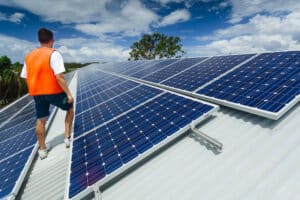
If you told someone that they could get energy for free once they had the necessary equipment, from the sun, they’d likely think you were joking. The thing is, that’s exactly how solar energy works.
As a result, solar energy is becoming increasingly popular for landowners, especially as the necessary equipment (most significantly, the panels) become increasingly affordable. We made this guide alongside the team at Exagen to provide you with a basic understanding of solar energy, and the main things you’ll need to consider before installing a solar panel system on your land.
What is solar energy?
Simply put, solar energy is energy that’s produced by the sun. It’s a renewable energy source that can be used to generate electricity through the use of solar panels, anywhere that the sun shines.
Solar panels are made up of photovoltaic (PV) cells that are used to convert sunlight into direct current (DC) electricity. This electricity can then be converted into alternating current (AC) electricity through an inverter, which can be used to power businesses, homes, and can even be sold back to the energy grid.
Why is solar energy important?
Solar energy is important because it’s renewable and, importantly, it’s free. Unlike fossil fuels such as coal, solar energy doesn’t produce greenhouse gasses that contribute to climate change.
Solar energy also reduces dependence on non-renewable resources like oil, which will eventually run out. Solar energy provides a high degree of energy independence, as it’s not subject to price fluctuations like traditional energy sources – especially relevant given the current energy market.
Things to consider before installing a solar panel system
These are just a few of the things you’ll want to think about before installing a solar panel system on your property.
Location
Solar panels require sunlight to produce electricity, so it’s important to ensure that your property receives adequate sunlight throughout the day. It may be the case that your panels are effective during summer, but not winter – this should all be factored into your overall energy plan.
Orientation
Solar panels should be installed facing south in the northern hemisphere to maximise exposure to sunlight. The angle of the panels should also be adjusted depending on the latitude of your location, to ensure optimal performance.
Size
The size of your solar panel system will depend on your energy needs and the available space on your property. A larger system will obviously produce more electricity, but will also require more space and will be more expensive to install.
Cost
The cost of a solar panel system will depend on the size of the system, the quality of the components, and the installation costs. It’s useful to think about the cost of your solar panel system in relation to your energy savings over time. Solar panel systems will pay for themselves eventually, both through energy savings and other government incentives, such as tax credits or rebates.
Solar energy is an important energy resource that can provide landowners with energy security while also leading to a range of energy-related cost reductions. Before installing a solar panel system from a company, you’ll need to consider how appropriate your land is for a solar system. By considering the factors listed above, you can ensure that your solar panel system is efficient and cost-effective, and will provide you with energy for years to come.
Read more:
Solar energy 101: a guide for landowners





